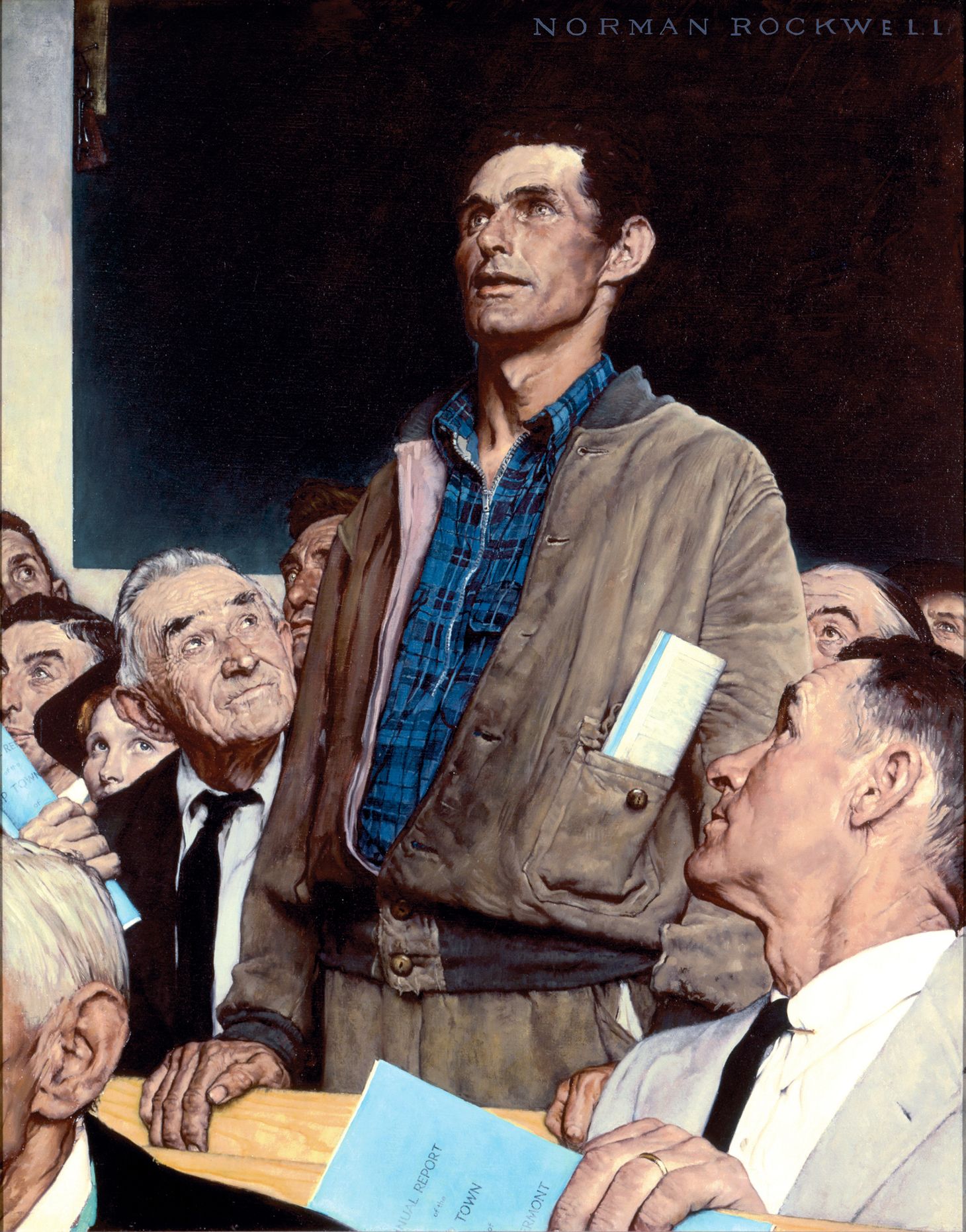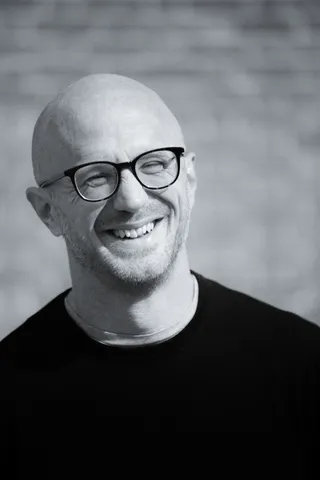Personal Values: Freedom of Speech

"Whose bread I eat, his song I sing." - German proverb
On January 6th, 1941, Franklin Roosevelt gave a speech that became known as his "Four Freedoms Speech."
In it, he articulated four essential freedoms that people "everywhere in the world" out to enjoy:
- Freedom of speech
- Freedom of worship
- Freedom from want
- Freedom from fear
Roosevelt's speech inspired a set of four paintings by Norman Rockwell, which ran in in four consecutive issues of The Saturday Evening Post. Perhaps because of the powerful imagery Rockwell used, the Four Freedoms stuck with me.
Last week, I encouraged you to sit down and try to figure out your set of personal values - your philosophical stance towards the world.
What are the things that truly matter to me? What are the values I would fight for? What are the values that, if spread widely, would most benefit the world?
In the next few emails, I'm going to explore some of my own values, using Roosevelt's "Four Freedoms" as a framework (albeit, with some modifications).
Let's start with Freedom of Speech.
---
“If only someone had told me beforehand that England would take up arms against us!” wailed the Kaiser during lunch at Headquarters one day later in the war.
Someone in a small voice ventured, “Metternich,” referring to the German ambassador in London who had been dismissed in 1912 because of his tiresome habit of predicting that naval increases would bring war with England no later than 1915.
In 1912 Haldane had told the Kaiser that Britain could never permit German possession of the French Channel ports, and reminded him of the treaty obligation to Belgium. In 1912 Prince Henry of Prussia had asked his cousin King George point-blank “whether in the event of Germany and Austria going to war with Russia and France, England would come to the assistance of the two latter powers?”
King George had replied, “Undoubtedly yes, under certain circumstances.”
In spite of these warnings the Kaiser refused to believe what he knew to be true.
Barbara Tuchman, The Guns of August
When we talk about "freedom of speech," we usually mean a governmental guarantee:
I won't arrest you for speaking up about your politics.
That's all well and good.
If you live in a relatively free country, as I am privileged to do, the issue is not whether or not you have freedom of speech, but what to do with that freedom.
You don't have to study history for very long before you realize that reluctance to speak up - to say the uncomfortable thing, to speak truth to power - is at the very root of some of humanity's most devastating failures.
Often, these failures occur simply because those in power choose to surround themselves with people who think exactly like them. As Barbara Tuchman writes in The March of Folly:
"Wooden-headedness, the source of self-deception, is a factor that plays a remarkably large role in government. It consists in assessing a situation in terms of preconceived fixed notions while ignoring or rejecting any contrary signs. It is acting according to wish while not allowing oneself to be deflected by the facts."
Self-deception, of course, is far more difficult if you are surrounded by those who speak up when they see you going wrong.
The tendency to surround ourselves with the like-minded is not limited to those in power. We all do it: democrats tend to live near other democrats. The middle-class tends to live near the middle-class.
What seems clear to me is this: surrounding yourself with people who think and act like you do leads to a narrow worldview, and a narrow worldview leads to bad decision-making.
Bad decisions, bad outcomes.
This is why diversity is important: without a diversity of opinion and worldview we will perpetually underperform. Without a variety of voices with different life experiences, we can only perceive and act on a tiny sliver of the world that surrounds up.
Without diversity we have only a partial view of the world. Without opposing opinions, we lurch towards extremism and neglect other options.
Freedom of speech isn't something that's just good for individuals; it's a critical component to making wise decisions, and wise decisions lay at the heart of any productive, just, and ethical society.
But speaking our minds isn't easy. In fact, it's monstrously difficult.
I'm reminded of this passage from Ordinary Men, a history of German police battalions during the second world war:
Pale and nervous, with choking voice and tears in his eyes, Trapp visibly fought to control himself as he spoke.
The battalion, he said plaintively, had to perform a frightfully unpleasant task. This assignment was not to his liking, indeed it was highly regrettable, but the orders came from the highest authorities. If it would make their task any easier, the men should remember that in Germany the bombs were falling on women and children.
He then turned to the matter at hand. The Jews had instigated the American boycott that had damaged Germany, one policeman remembered Trapp saying. There were Jews in the village of Józefów who were involved with the partisans, he explained according to two others. The battalion had now been ordered to round up these Jews. The male Jews of working age were to be separated and taken to a work camp. The remaining Jews—the women, children, and elderly—were to be shot on the spot by the battalion.
Having explained what awaited his men, Trapp then made an extraordinary offer: if any of the older men among them did not feel up to the task that lay before him, he could step out.
This battalion leader is giving his soldiers a choice:
Stay where you are, and you will directly participate in ethnic cleansing.
Step out of line, and you will be excused from the task with no penalty.
None stepped out of line.
All of us want to believe that we are morally superior to those men; that we, in the same situation, would have been more brave.
That we would have done the right thing.
That we would have stepped out of line.
But speaking up is hard to do.
It's hard to stand out, to make yourself known to those around you.
It's hard to say you won't, when others are saying they will.
It's hard to put your career, or the opinion of your comrades, on the line.
Especially when you're unsure about what's right. Do you really think YOU know best, when everyone else is saying otherwise?
If diversity of opinion and background is required to make the best decisions, and we each need to speak up in order to create a diversity of opinion...
How do we do that?
There is one thing that I know influences our willingness to speak:
Dependence.
That's the meaning of the proverb we opened with:
"Whose bread I eat, his song I sing."
If someone is paying your bills?
If you rely on them to feed your kids?
If they have power over you, whether physical or emotional?
You will be far less likely contradict them.
Far less likely to speak up.
Far less likely to step out of line.
The willingness to speak our minds - to actually use our freedom of speech to make the world a better place - directly hinges on our independence, our ability to go it alone if need be.
This doesn't mean that we can't rely on anyone, or that we need to sever our connections to the world at large.
It simply means that we must be secure in our ability to make our own way, if it came to that.
We have to be strong enough to know that we could weather any storm. That we could survive the worst-case scenario.
Because make no mistake:
Speaking out against those in power always carries a cost.
It could be an economic cost.
It could be social.
Or emotional.
But free speech, when it contradicts prevailing wisdom? When it rejects the orthodoxy of the powerful?
It is never truly free.
This is why the exercise of free speech is one of my most important values.
I deeply, deeply respect those who are willing to say what they think and pay the costs for doing so.
(This is also why I have disdain for those who want to have it both ways - to say what they want, but to avoid any responsibility for doing so).
We need diverse voices. We need you to be willing to speak.
And that means that each of us needs to be strong and secure enough within ourselves to pay that price when the time comes.
That's what freedom of speech means to me.
COOL THINGS TO READ:
Here's something I didn't expect to write:
I found myself absolutely spellbound this weekend by an in-depth breakdown of the engineering behind the Nespresso Vertuo.
Just give it a shot, it's wonderful.
Better Questions Newsletter
Join the newsletter to receive the latest updates in your inbox.
